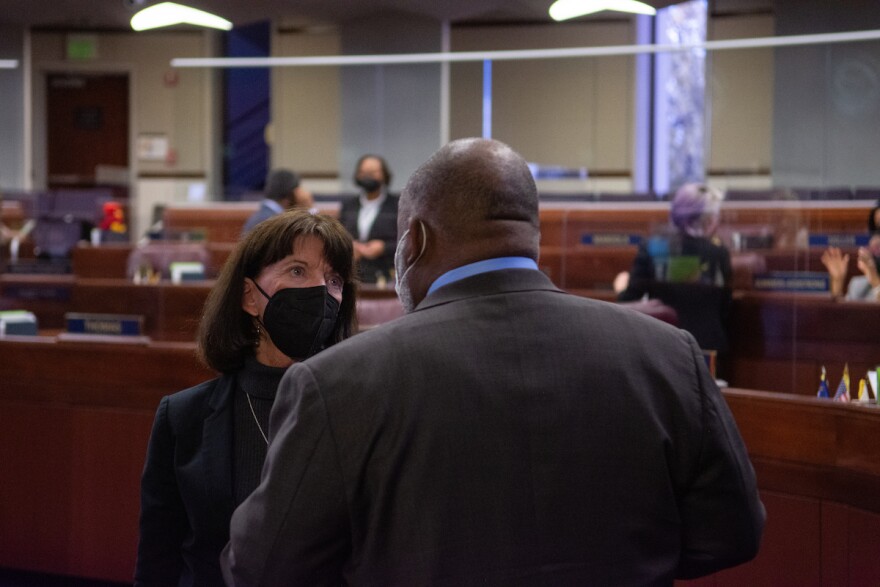Nevada will get about $4.5 billion under the Biden Administration’s American Rescue Plan. And while the federal government will place some limitations on the money, it’ll be up to lawmakers to decide how the state should use its portion of the funds. Republican, Doctor Robin Titus serves as the Assembly Minority Leader. She sat down with KUNR’s Paul Boger to discuss the session and the state’s financial situation.
PAUL BOGER: Earlier in the session, through the governor's office and through leadership downstairs, we heard a lot about this particular session dealing with the pandemic. That's what lawmakers were supposed to be concentrating on. In your opinion, is that what lawmakers are concentrating on?
ROBIN TITUS: Initially. The speaker and I, we do have a good relationship and we have good conversations. And so I've been fortunate enough to be able to reach out to him and he reaches back to me. We don't always agree, but we do communicate. So that's really important. It was our understanding, my understanding, that we were going to have limited coverage of what we did in the session dealing with the economic results of this pandemic, solving some of these problems, and passing the budget. And that's probably all we would do. That's what we started at. Unfortunately, now we've seen some of these major election reform bills. These gun bills. We still don't know about the education issues and how we're going to fund that. So now we're seeing it morph into major agendas from some committee chairs. They're putting up bill after bill, after bill, [and] we're just going ‘Oh my gosh, this is not what we intended to do this session,’ at least what I anticipated [in] the session, a lot because of the restrictions and stuff we have to get done. And the fact that we just can't debate all this stuff that we're seeing now. So, I think it's morphed into more than what we anticipated.
BOGER: The state's getting about $4.5 billion from the latest COVID relief bill. How should the state use that money? What are your priorities?
TITUS: We can use it to fill some of the one-time appropriations, and I'm absolutely okay with that. We need infrastructure in this state. We know some of our buildings, the Grant Sawyer Building, especially, is crumbling. We know there are building issues. We need to fix some of those one-time appropriations. Then we need to fix our highway fund. Then we need to restore the rainy day fund. We don't have to spend all this money. We need to be wise about it.
To that end, the worst thing we could do is use it to expand government. Because, at that point in time when that money runs out, we're going to fall off a cliff. Then we're going to go back to Nevada taxpayers and ask them to continue whatever expansion we do. So what I, and most of my colleagues would say, is that we need to make sure that we use one-time appropriations to make sure we fix some things we can fix, one time - not expand government. Save some on the money in our rainy day fund. I wish I could say this would be our last disaster, our last recession, [or] our last pandemic, but you and I both know, we've lived through these other things before, maybe not this pandemic, but certainly the Great Recession. So we need to be wise about that. And so there are certain places that we could spend this money wisely.
BOGER: The first conversation we had on Day One was [about] the potential for tax increases and talking about bipartisanship. I think at that time you said there was still room for negotiation and conversation. Is that still on the table?
TITUS: As time goes by, we get more information on what the budget looks like. And the reality is, we're going to have our economic forum come, probably May 3. It will be made there because it falls on a weekend. So it won't be May 1. So we'll probably see it on May 3. We're probably going to have more revenue than anticipated, number one. Number two, we've had a chance to look at the budget, now. We have sat down and really kind of teased out where we thought we could make some savings. We, as you know, have to have a balanced budget when we sine die. We cannot count on the fed money to balance that budget. So we are looking hard on doing that without tax increases. And we believe when we started the session that we had a $500 million gap. We believe that we have found enough places to make sure we fill that $500 million gap, that there will be no need for tax increases.
BOGER: And have you heard from the speaker or from leadership downstairs about when those mining taxes might be brought up?
TITUS: Well, I do not see us discussing those in the session.
BOGER: At all?
TITUS: I wish I was in charge of the “at all” statements, but I'm not. So, you know, at this point in time, I don't see them coming back around where we'll have that debate on them this session. But hey, anything can happen in this building.





